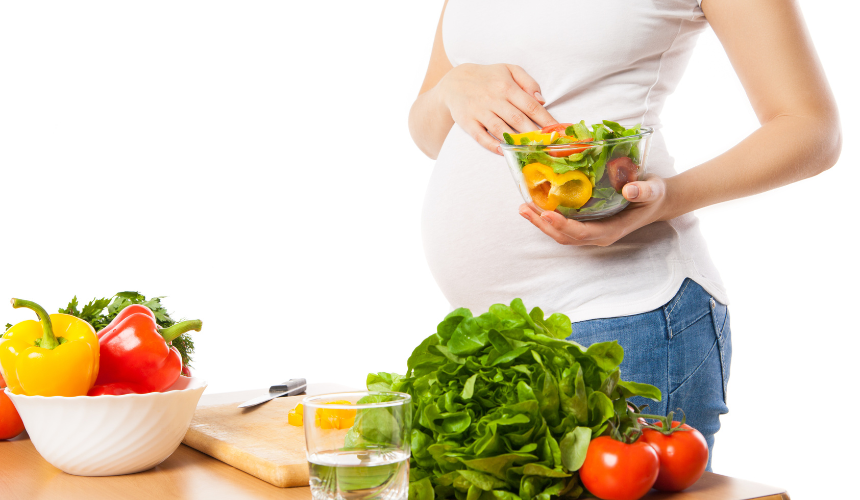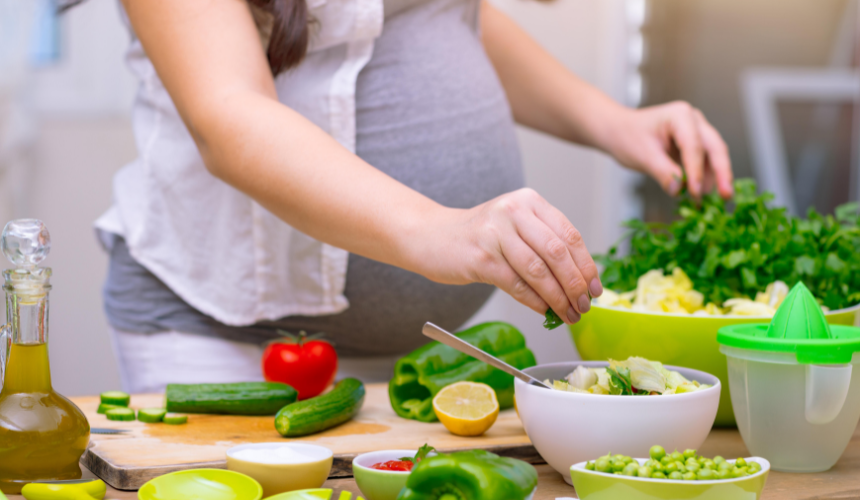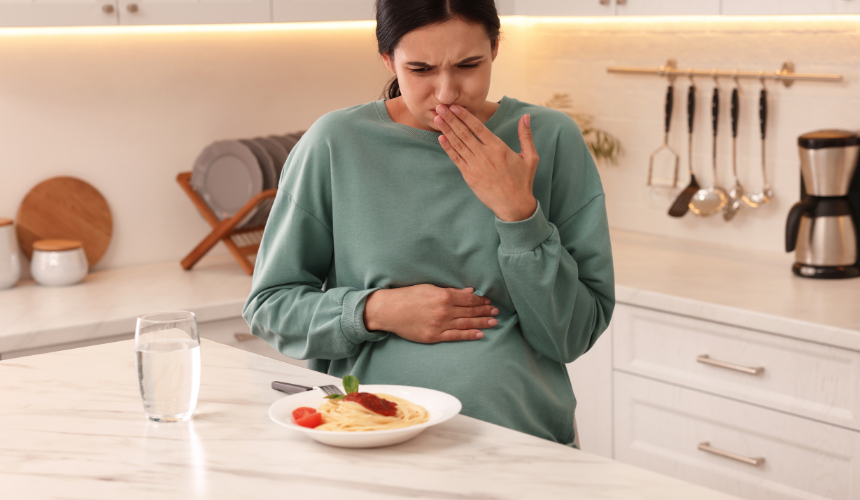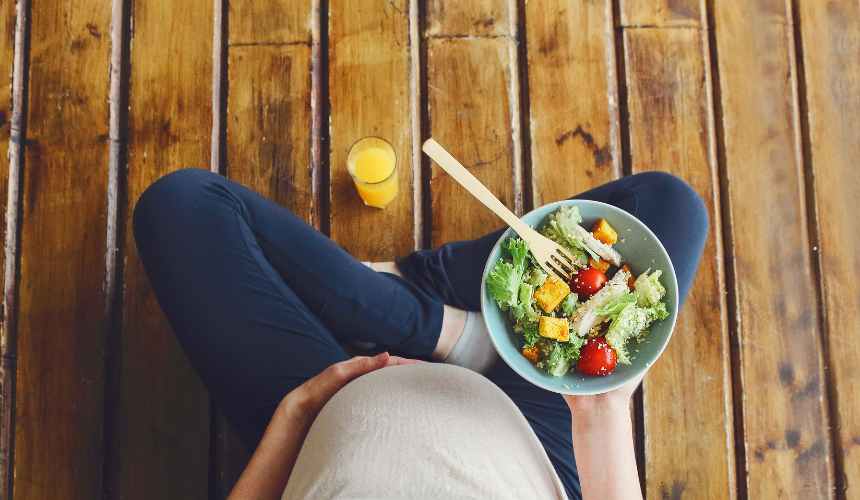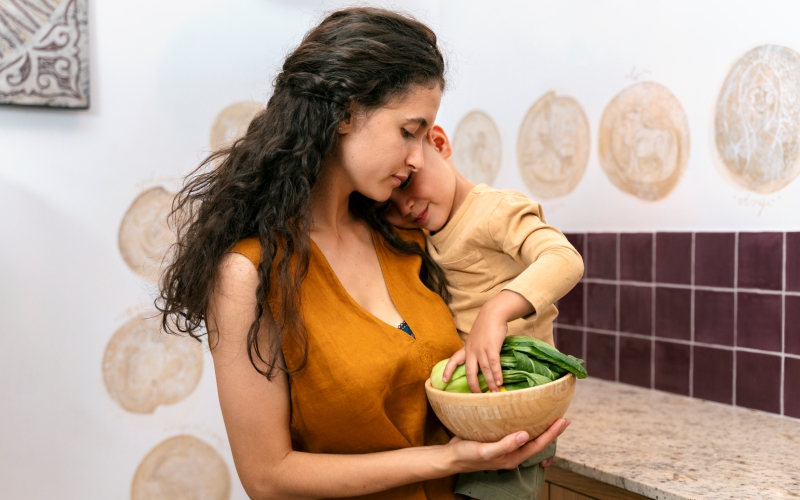Author: Dr. Asha Baxi MBBS, FICOG, FRCOG, MS
Consultant – Obstetrician, Gynecologist & Infertility Specialist at Motherhood Hospital, Indore
Pregnancy Diet Plan: Month By Month (Veg and Non-Veg Foods)
Maintaining a healthy and balanced diet is important for everyone, but it is especially crucial for pregnant women. A balanced pregnancy diet can provide the essential nutrients needed to support the healthy growth and development of the baby, while also helping to prevent complications during pregnancy. In addition, research has shown that a healthy diet is linked to improved mental health outcomes, which is particularly important for pregnant women who may experience increased stress and anxiety during this time. By focusing on nutrient-dense foods and essential nutrients, pregnant women can support both their physical and mental health throughout their pregnancy journey.
Essential Nutrients during Pregnancy
During pregnancy, you need to ensure that you are consuming enough essential nutrients to support your baby’s growth and development. Essential nutrients include folic acid, iron, calcium, protein, omega-3 fatty acids, and vitamin D. Folic acid is essential for preventing birth defects, iron is essential for preventing anaemia, calcium is essential for supporting your baby’s bone development, protein is essential for supporting your baby’s muscle and tissue development, acids are essential for supporting your baby’s brain development, and vitamin D is essential for supporting your baby’s bone development.
Regardless of dietary preferences, pregnant women require a variety of essential nutrients for a healthy pregnancy. These include:
- Protein: Essential for growth and development of the fetus. Good sources for vegetarians include legumes, tofu, nuts, seeds, and whole grains. Non-vegetarian sources include lean meats, fish, and poultry.
- Omega-3 fatty acid: Essential for supporting your baby’s brain development. Sources of omega-3 fatty acids include fatty fish like salmon and sardines, as well as nuts, seeds, and plant oils like flaxseed oil and canola oil. However, it can be difficult for vegetarian women to get enough EPA and DHA through diet alone.
- Iron: Required for the formation of red blood cells in both the mother and the baby. Good vegetarian sources include dark leafy greens, beans, lentils, fortified cereals, and whole grains. Non-vegetarian sources include beef, chicken, and seafood.
- Calcium: Essential for the development of strong bones and teeth in the fetus. Good vegetarian sources include dairy products, fortified plant milks, tofu, and leafy greens like kale and collard greens. Non-vegetarian sources include dairy products and canned fish with bones.
- Vitamin D: Helps the body absorb calcium and is important for bone health. Good vegetarian sources include fortified plant milks, mushrooms, and exposure to sunlight. Non-vegetarian sources include fortified dairy products, egg yolks, and fatty fish.
- Folate: Important for fetal development and reduces the risk of birth defects. Good vegetarian sources include leafy greens, beans, lentils, and fortified cereals. Non-vegetarian sources include liver and fortified grains.
- Fibre: The Intake of fibre rich foods during pregnancy decreases diabetes risk, preventing constipation & Preeclampsia also helps in promoting good health.
It’s important for vegetarian women to ensure they are getting enough of these essential nutrients through a balanced vegetarian diet or supplements, especially since some nutrients like iron and calcium are often more easily absorbed from animal sources. Consult our experts at Motherhood Hospitals to understand your options for supplementing your diet.
First Trimester Nutrition: Foods to Eat and Avoid for a Healthy Pregnancy:
First trimester of pregnancy can be challenging in terms of diet, as many women experience nausea and vomiting, which can make it difficult to eat a healthy and balanced diet. However, it’s important to ensure that you’re getting enough nutrients during this critical time of fetal development.
During the first trimester, focus on consuming foods that are rich in essential nutrients such as folate, iron, and calcium. Foods that are high in folate include leafy green vegetables, fortified cereals, and legumes. Iron-rich foods include red meat, poultry, fish, fortified cereals, and legumes. Calcium-rich foods include dairy products, leafy green vegetables, and fortified plant-based milk.
Vegetarian women can meet their nutritional needs during pregnancy by consuming a variety of nutrient-dense plant-based foods:
- Protein is essential for fetal growth and development, and vegetarian sources of protein include beans, lentils, soy products, nuts, and seeds.
- Iron is essential for preventing anaemia, and vegetarian sources of iron include leafy green vegetables, dried fruit, fortified cereals, and legumes.
- Vitamin B12 is essential for nervous system development, and vegetarian sources of vitamin B12 include fortified cereals, nutritional yeast, and fortified plant-based milk.
- Calcium is essential for fetal bone development, and vegetarian sources of calcium include leafy green vegetables, fortified plant-based milk, and tofu.
Second Trimester Nutrition: The Best Foods to Eat During Your 2nd Trimester

Second trimester is often considered the most comfortable period of pregnancy, as nausea and vomiting tend to subside, and energy levels increase. During this time, it’s important to continue focusing on a healthy and balanced diet, as the fetus continues to grow and develop.
During the second trimester, it’s important to ensure that you’re consuming enough protein, calcium, and vitamin D, which are essential for fetal bone development.
- Good sources of protein include lean meats, fish, eggs, dairy products, beans, and legumes. Vegetarian women can also get protein from sources such as soy products, nuts, and seeds.
- Calcium-rich foods include dairy products, leafy green vegetables, and fortified plant-based milk.
- Vegetarian women should ensure that they are consuming enough omega-3 fatty acids, which are essential for fetal brain development. Vegetarian sources of omega-3 fatty acids include flaxseed, chia seeds, walnuts, and algae-based supplements.
The Final Stretch Third Trimester: Pregnancy Meal Plan for 3rd rimester
Third trimester, the fetus continues to grow and develop rapidly, and it’s important to ensure that you’re getting enough nutrients to support this growth. In addition, as the uterus expands, it can put pressure on the stomach, making it difficult to eat large meals. Therefore, it’s important to focus on consuming nutrient-dense foods that are easy to digest. During the third trimester, it’s important to consume enough protein, iron, and calcium. Good sources of protein include lean meats, fish, eggs, dairy products, beans, and legumes.
- Vegetarian women can also get protein from sources such as soy products, nuts, and seeds.
- Iron-rich foods include red meat, poultry, fish, fortified cereals, and legumes.
- Calcium-rich foods include dairy products.
Managing Dietary Restrictions During Pregnancy
It is important to be aware of dietary restrictions during pregnancy, whether you are a vegetarian or non-vegetarian. Certain foods should be avoided to reduce the risk of foodborne illness and other complications. For example, pregnant women should avoid raw or undercooked meat, poultry, and fish, as well as unpasteurized dairy products and juices. They should also limit their intake of caffeine and avoid alcohol and smoking altogether. Vegetarian women may have additional restrictions if they avoid certain animal products such as meat, fish, eggs, and dairy. However, with careful planning and the inclusion of alternative protein sources such as legumes, tofu, nuts, and seeds, a healthy and balanced vegetarian pregnancy diet is possible. It is important to speak with a healthcare provider or registered dietitian to ensure that all nutrient needs are being met and to address any concerns about dietary restrictions.
In conclusion, a healthy and balanced pregnancy diet is essential for both the mother and the developing baby. It can be challenging to know what to eat during each trimester, but by focusing on nutrient-dense foods and essential nutrients such as folate, iron, calcium, protein, omega-3 fatty acids, and vitamin D, you can support the healthy growth and development of your baby. If you have any concerns or questions about your pregnancy diet or any other medical support you need, consider reaching out to us at Motherhood Hospitals. We can provide you with the guidance and support you need to have a healthy and successful pregnancy.
At Motherhood Hospitals, we have a team of experienced supers specialists backed by the latest infrastructure and facilities. We have the best gynaecologist in Indore. We are experts in handling complex deliveries, gynaecological, and other surgeries including a range of laparoscopic surgeries.
Do take an appointment with the best maternity hospital in Indore at a centre closest to you. Meet with our doctors who will carry out the required investigations, diagnose the issue and recommend the most appropriate treatment, enabling you to lead an active life.
If you wish to get in touch with Dr. Asha Baxi, please book your appointment here.
FAQ’s:
- What are the essential nutrients that pregnant women need?
Essential nutrients that pregnant women need include iron, calcium, folic acid, protein, vitamin D, and omega-3 fatty acids. It is important to eat a variety of nutrient-rich foods to ensure proper nourishment during pregnancy. - How can vegetarian women ensure they are getting enough essential nutrients during pregnancy?
Generally, including lentils, beans, nuts, seeds, dairy products, and fortified cereals can help you get the essential nutrients during the pregnancy . Consult with your dietitian for expert guidance and get an individualized diet plan. - What are the best foods to eat during the first trimester of pregnancy?
Fresh fruits and vegetables, whole grains, lean protein sources like lentils and chicken, and dairy products like milk and yogurt. These foods provide essential nutrients for fetal growth and development. - What are the dietary restrictions for pregnant women?
Certain foods to avoid during pregnancy are raw or undercooked meat and eggs, unpasteurized milk and dairy products, and certain types of fish that may contain high levels of mercury. It is also important to limit caffeine intake during pregnancy. - How can a doctor help pregnant women with their diet?
Doctors can help by providing guidance on meal planning and nutrition. They can also monitor the mother’s and baby’s health throughout pregnancy to ensure proper nourishment and growth.


 Toll Free Number
Toll Free Number







